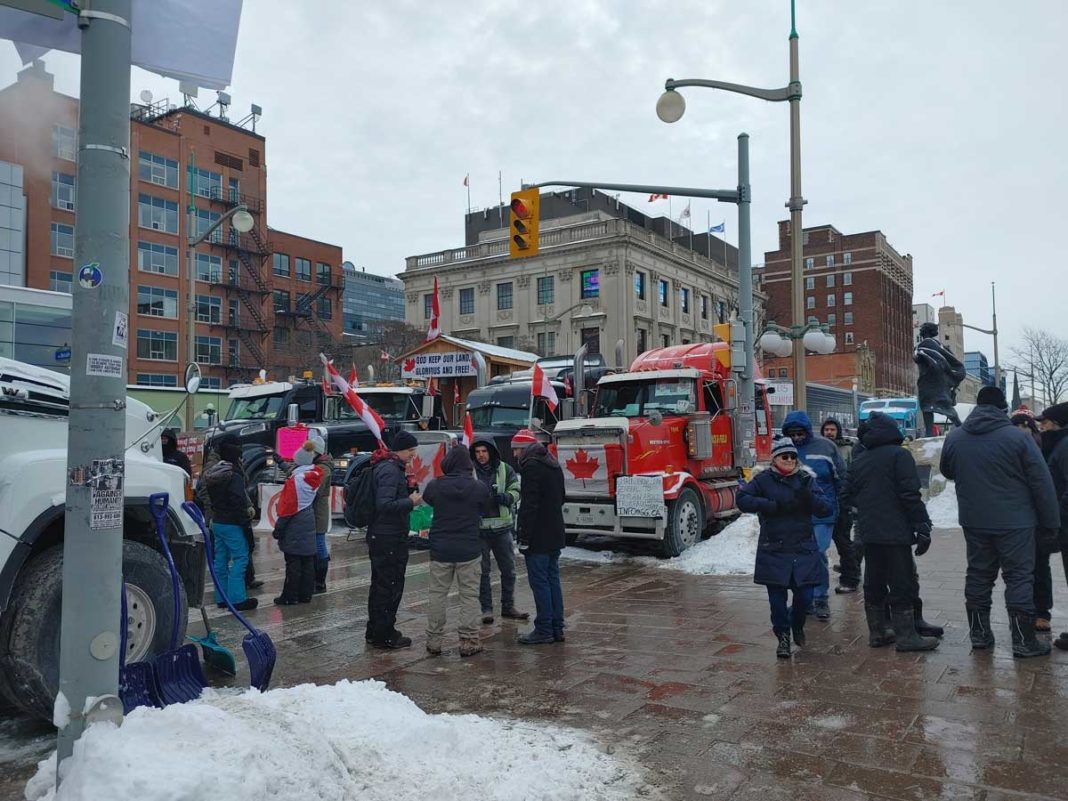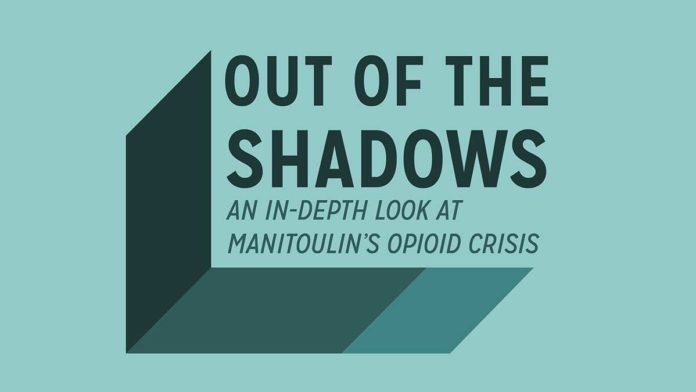Reports from Ottawa on protest offer mixed reviews of the situation
OTTAWA—The Freedom Convoy protest in Ottawa is entering its second week and The Expositor reached out to some of those at, or near, ground zero to elicit their first-hand accounts of what they are seeing at street level in the nation’s capital with Parliament under siege.
The reports received back were somewhat mixed—and perhaps dependant on the observer’s perspective. In this case, Ottawa residents juxtaposed with those of the convoy participants.
Former Expositor managing editor Ian Gibb worked for the paper from 1971 to 1974, taking on the managing editor’s role from 1973. Mr. Gibb went on to earn a math degree from the University of Waterloo and enjoyed a successful career as an actuary. He is now retired.
“I live close to downtown,” said Mr. Gibb when contacted at his home in Ottawa. “I’m about three kilometres from Parliament Hill.” He and his wife are enjoying the company of their new grandchild, who lives next door with their daughter and son-in-law.
“Our lives have been pretty restricted because of COVID and there hasn’t really been much reason to go downtown lately,” he said. “I mention the distance because of the constant honking. We are three kilometres away, as the crow flies, and we recently had triple-pane windows installed. They are supposed to keep out the noise, as well as the cold.” But the honking still gets through. “It still goes on until 11 at night and then starts up again around 5 in the morning.” He noted that the honking had abated a bit (on Friday afternoon), but “over the last couple of days they have been doing it a lot.”
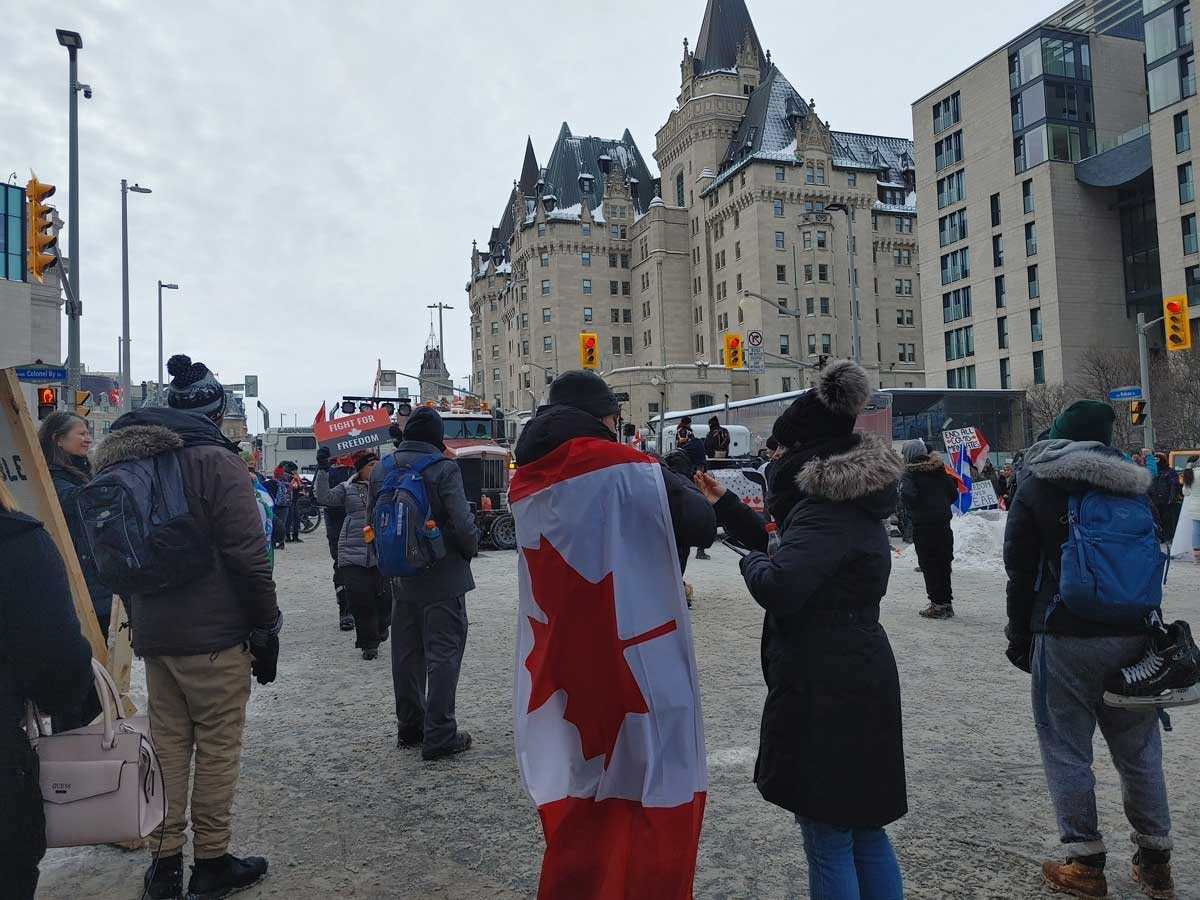
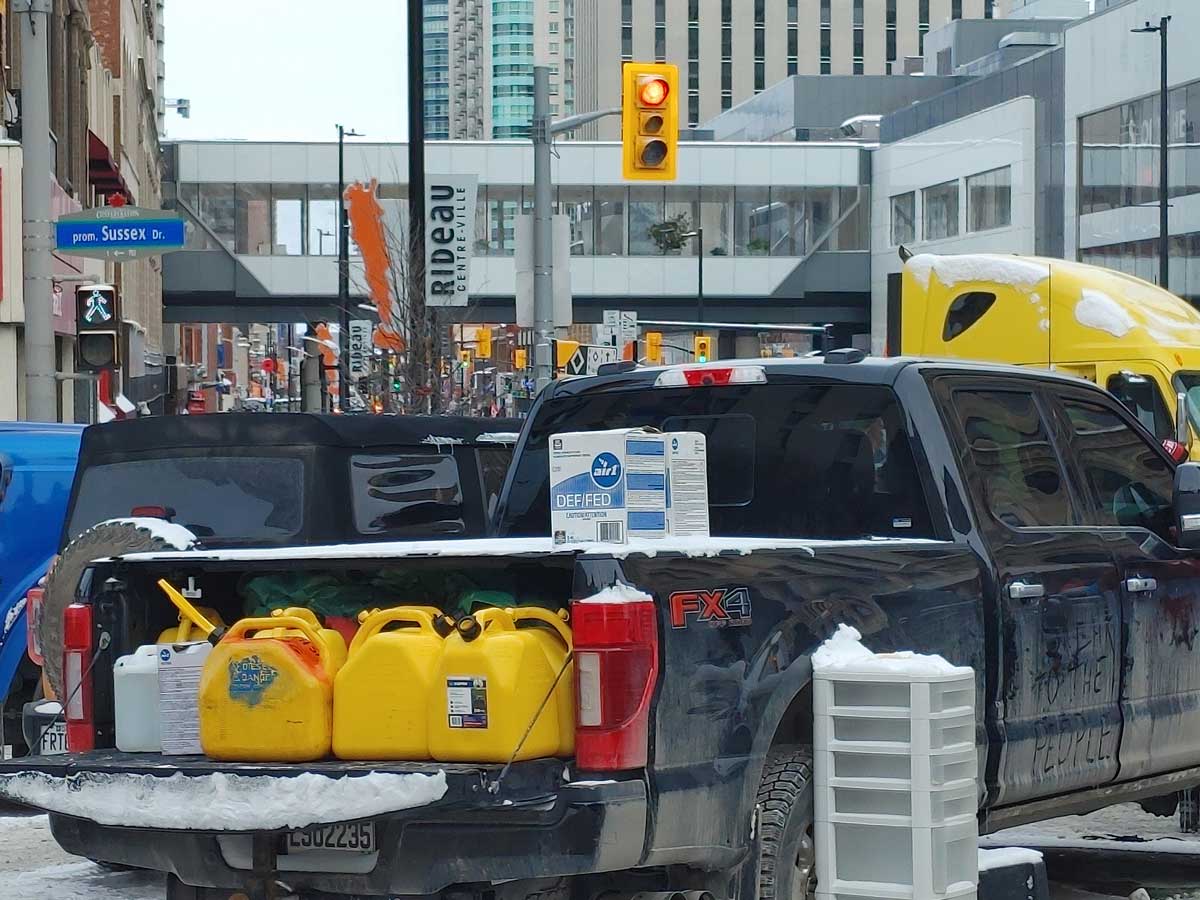
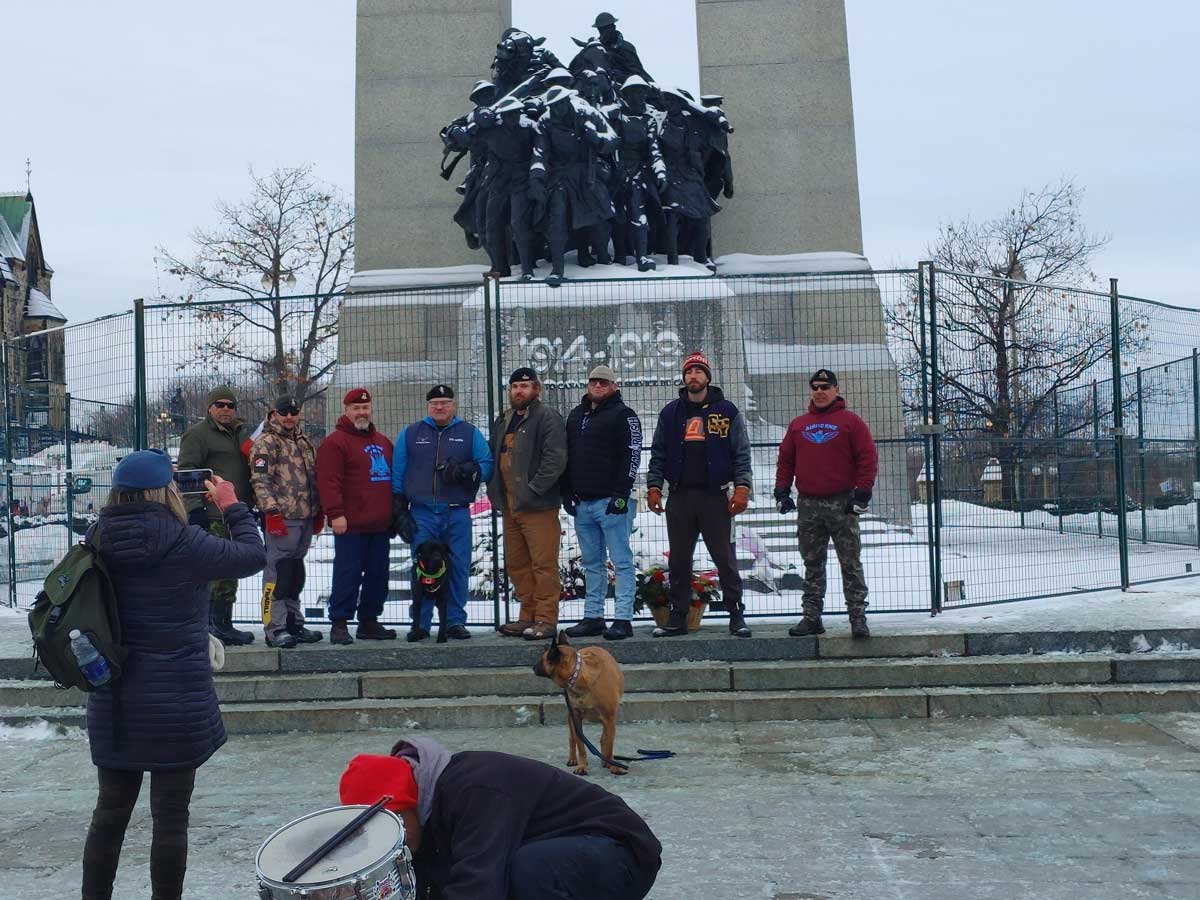
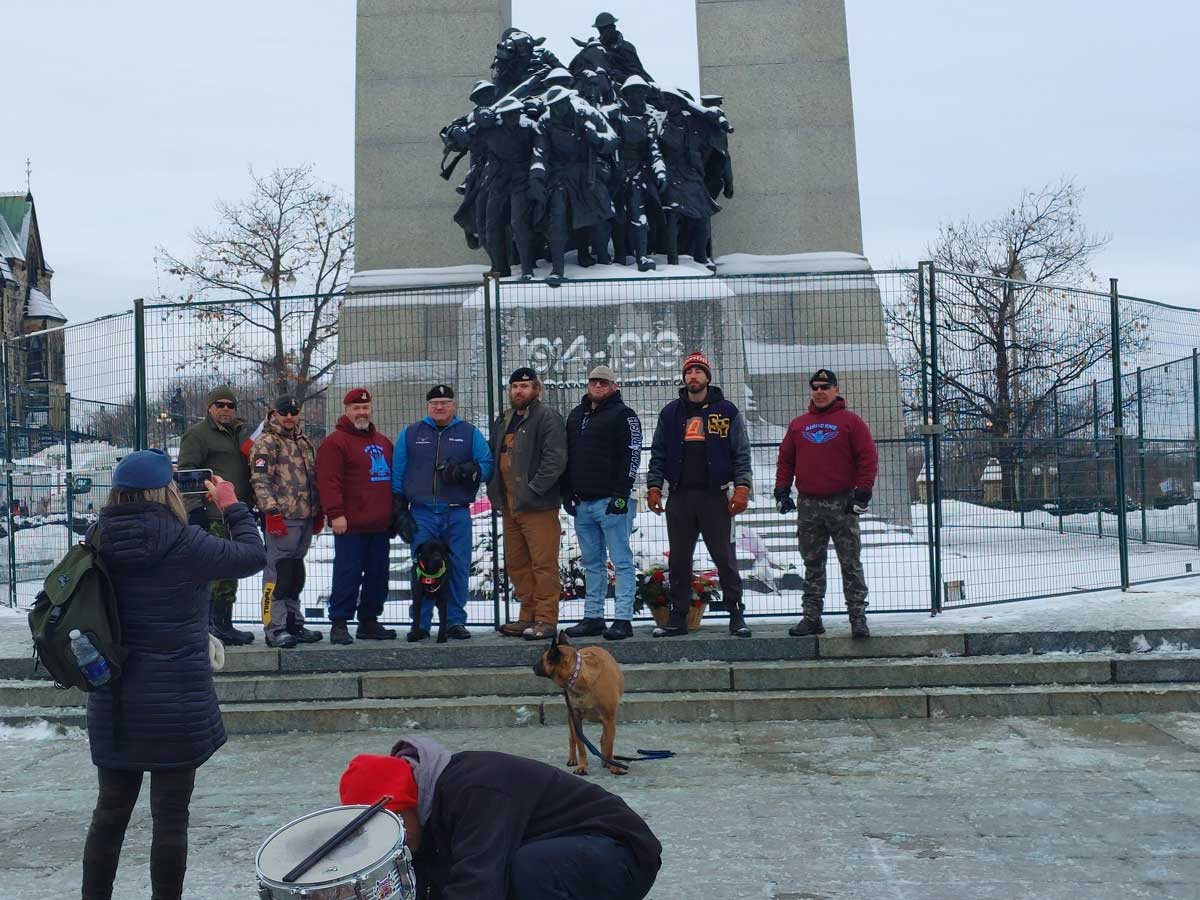
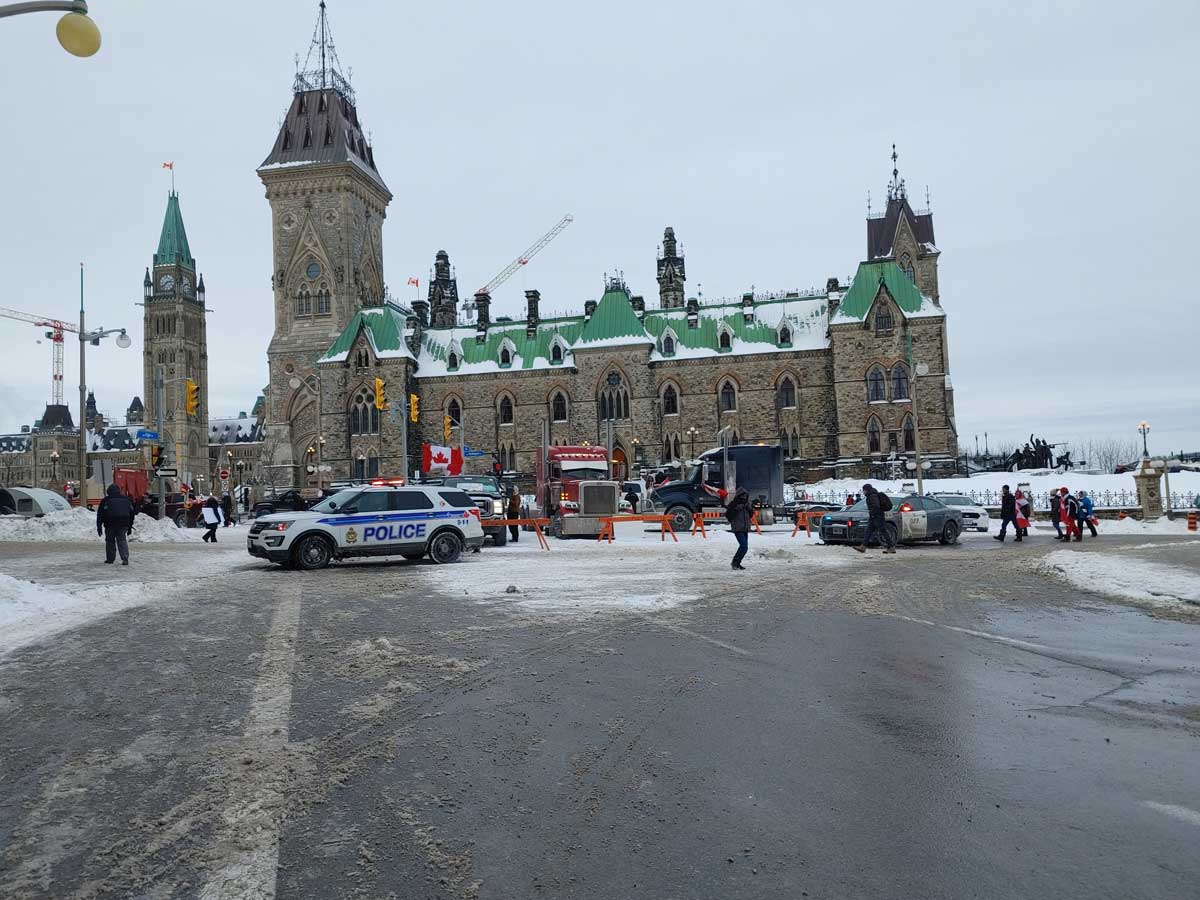
Mr. Gibb said that he had ventured out to go skiing in the Gatineau hills (just across the Ottawa River) last weekend as the convoy began to arrive in the city. It is a trip that usually takes him about 20 minutes. “It took me about four or five hours to get back,” he said. “There was only one bridge working. I tried two before I find one where I could get across the river. I thought ‘I’m going to run out of gas’.”
When he finally reached a gas station, he found a lot of vehicles were gathered to fill up. “A lot of the people were participating (in the convoy),” he said. He described the atmosphere as “kind of jolly.”
He noted that there were a “lot of trucker signs.”
“I’m not that fond of the convoy,” admitted Mr. Gibb. Sentiments he said he shares with most of his neighbours. “I was a teenager in the 1960s and we protested just about everything, but this constant honking day and night…”
Some of the frustration he shares with his neighbours is focussed on the authorities and what they see as a double standard being applied. “This is most descriptive,” he said. “One of my neighbours just got a $135 parking fine. But you can park a transport across seven parking spots you’re fine.”
Corey Boyle is one Islander who, along with his wife and dogs, enthusiastically joined the convoy as it made its way south. Since heading out, Mr. Boyle’s wife and one of the dogs have returned North to stay with her parents in Sudbury and be closer to the hospital as her pregnancy nears term. “It’s a lot less stressful for her there,” he said. Their story was featured on the front page of the February 2 edition of The Expositor.
“I’m back down here,” said Mr. Boyle when contacted by The Expositor on the weekend. “We are getting a lot of support from the locals. Everyone is getting together—it’s really peaceful.”
Mr. Boyle said that the police have been generally supportive of the convoy. “A police officer escorted me while I was delivering diesel, another offered me a fist bump,” he said. But he added that support was not universal among officers. “It’s a bit divided,” he said.
Mr. Boyle said that he was acting largely in a support role while at the convoy, working with another Islander, Brendan Addison, who was wielding his mechanical skills engaged in service work to keep the trucks operating smoothly. In fact, the protestors have been getting more and more organized as time goes on.
“We’ve got block leaders set up now,” he said. He noted that Mr. Addison and himself were set up at Kent Street and Laurier Avenue, about a kilometre out from the Parliament buildings. As for the business reaction to the convoy, Mr. Boyle said it was very appreciative. “Most businesses here are open,” he said. “It’s all government business. With the pandemic and everybody working from home, before we got here they were lucky to be taking in $60 a day one older lady who operates a bistro business with her sister in the Chateau Laurier told me ‘until you guys showed up’.”
“Another guy from Espanola said he has been getting messages from businesses all over the Island with lots of support,” said Mr. Boyle. He laughed at the idea that any of the trucks on the street might be towed. “They already tried to get the towing companies to do that, they all turned them down,” he laughed. “They don’t want to lose business.”
Mr. Boyle asserted the honking generally ends around 8 pm and does not start up again until around 8 am—an assertion also made by some of the convoy organizers in a recent press conference. During the early afternoon call the odd transport horn could be heard ringing out.
The Expositor checked in with Mr. Boyle again on Sunday; he said that things remained largely the same.
“I picked up about 30 pairs of socks while I was back home and around 20 pillows, so I have a nice comfortable bed set up in my back seat,” he said. “Someone came by and filled my vehicle with gas and there is always someone knocking on my door and asking if I need water or food or anything.”
But the news was not all good on the Boyle convoy front. “I got terrible news last night,” he said. “We had a GoFundMe Manitoulin page set up with a goal of $400 for gas and such. We got about $450 and then another $300 in cash donation at Nairn, but when I was checking my Facebook page last night and going to put the GoFundMe on it, they had taken the page down.”
Mr. Boyle said that he was fortunate to have downloaded a $50 donation from Chris Noland before it was shut down. “Chris called me up and asked if I got the money. He said he had donated to the convoy fund as well and he didn’t want to have to go through the trouble of getting it back (GoFundMe announced it had frozen the Freedom Convoy account that had raised nearly $10 million), I told him I got his donation, but he would probably have to go through getting the refund.”
In the meantime, Mr. Boyle said that Mr. Addison had been out until 11 pm the night before assisting truckers with their mechanical problems. “He’s helping out a lot of folks,” he said. “Brendan has been talking on the phone with Tamara (Lich of Alberta, one of the initial organizers of the Freedom Convoy). They met at the head of the convoy when it went through Nairn. He told her he’s First Nation and the work he is doing to support the folks down here.”
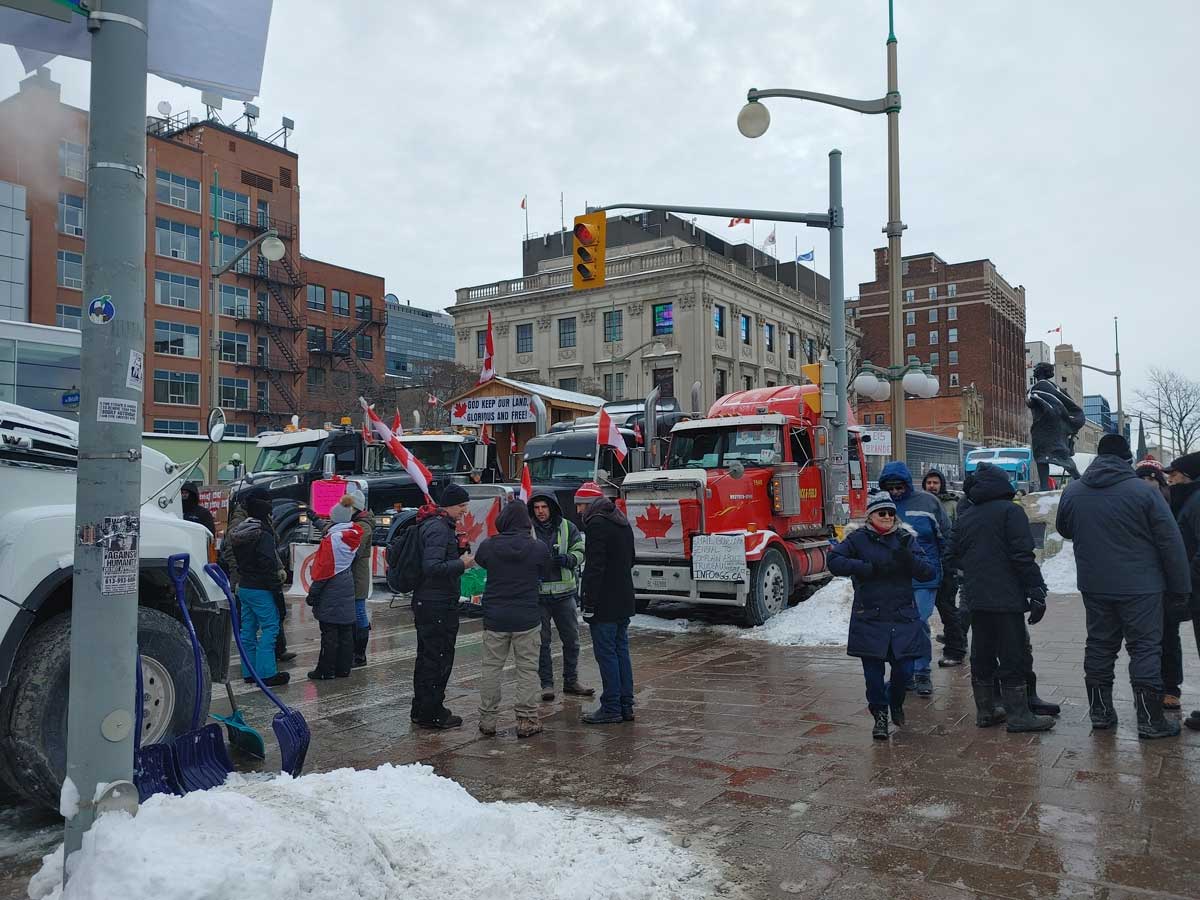

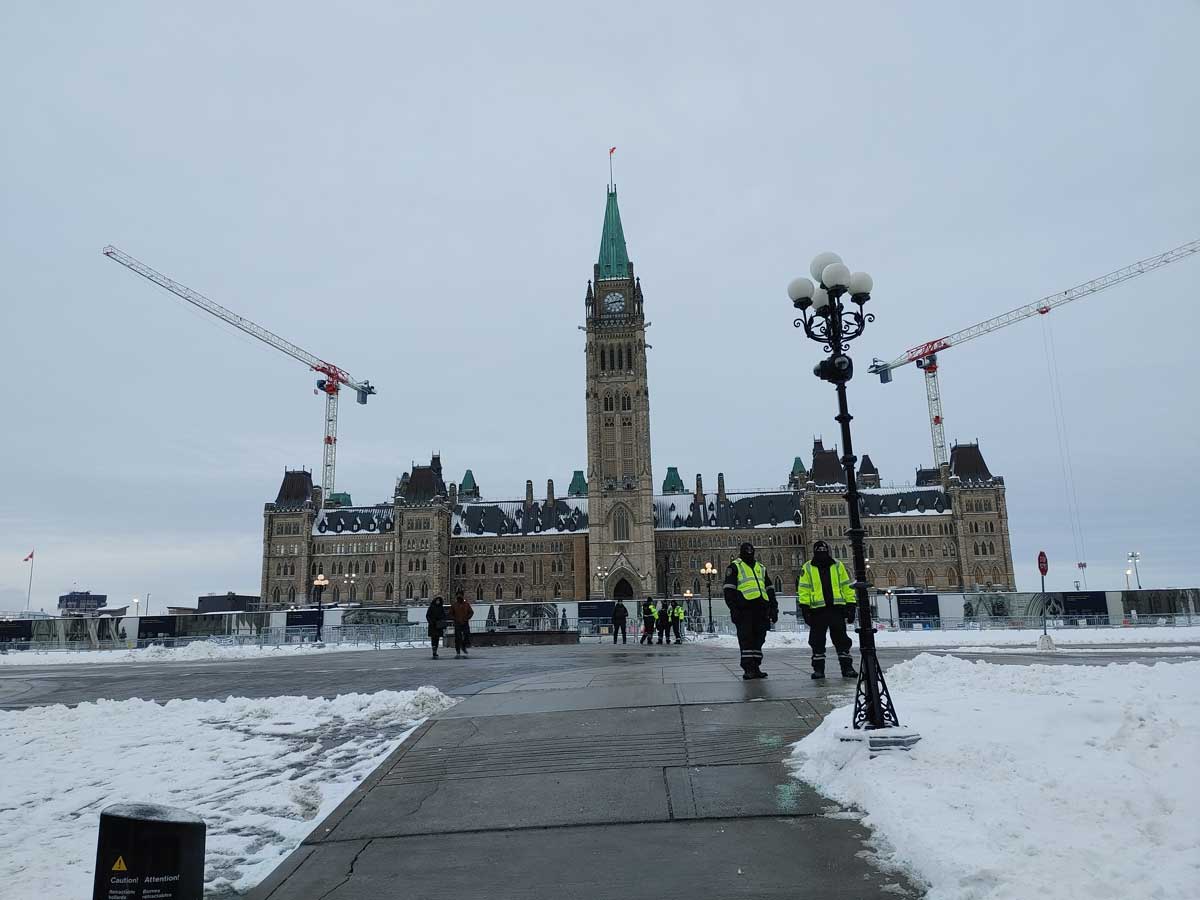
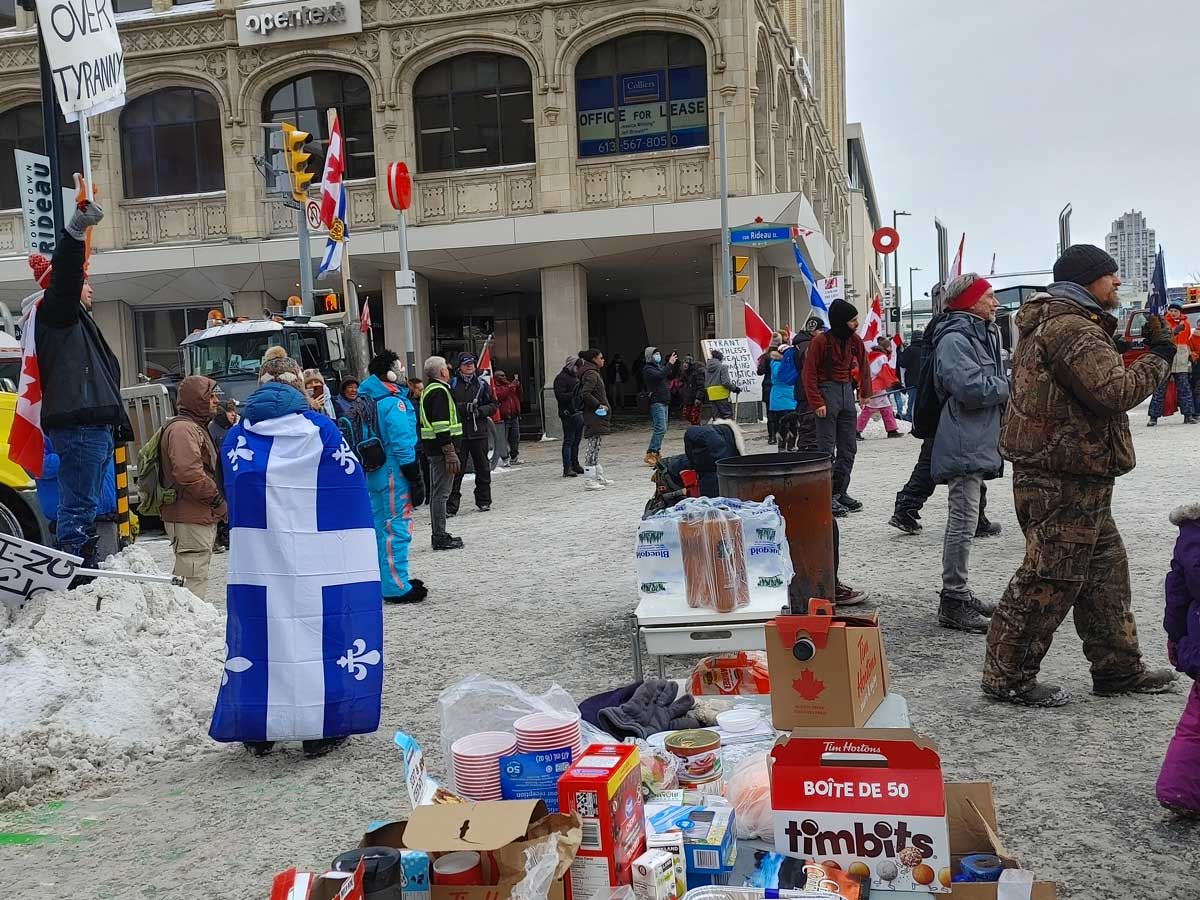

Former Expositor colleague, now director of education with the Legacy of Hope Foundation, Jane Hubbard currently makes her home in Ottawa and the paper reached out to discover what she has seen and experienced.
“I live out in the burbs,” she said, admitting that she had little first-hand knowledge of what was happening on the ground outside of what everyone else see on the news. But she agreed to once again channel her intrepid journalist skills to take a bit of a road trip to document in video and photographs what was going on downtown.
“It was a spectacle,” she said as she returned home. “People I saw were all in a pretty good mood, there was lots of open drinking and not a huge police presence.” She did note that there were numerous uniformed officers from the OPP, RCMP and Ottawa police forces in evidence. “All three were out and about,” she said. “Some officer were walking in groups up and down.”
Most notable, she said, were police cruisers that were blocking off laneways to prevent trucks from entering. “People couldn’t drive down those laneways,” she said, but added that pedestrian traffic down the laneways was being permitted.
Ms. Hubbard noted that her daughter Hannah normally works in a bistro in the Chateau Laurier, but that “mom won’t let her work there while this is going on.”
“It’s a party atmosphere,” said Ms. Hubbard, “there’s two stages set up on the beds of trucks and a bad rapper singing a terrible song. Lot’s of handwritten signs.”
Getting closer to Parliament Hill, Ms. Hubbard noted that “no one is being allowed on the Hill, but there are trucks lined up all along Wellington Street and a truck pulled up with an arrow pointed toward the PMO office (prime minister’s office).”
There’s lots of stickers on the sides of trucks, plenty of f*ck Trudeau signs. “It’s interesting, these signs and stickers are not hastily-made signs, there was a lot thought put into them,” she offered. “Someone must be selling them.”
“There’s a guy with jerry cans refueling trucks,” she observed. “He’s pulling along a kid’s wagon with jerry cans and a Captain Canada guy.”
Although she saw plenty of Canadian flags, both right-side up and upside down, Ms. Hubbard said that she did not observe any Nazi or Confederate flags in her travels through the protest area. “I was looking out for them,” she said. “It’s a peaceful, celebratory mood. There’s a truck blaring George Michael’s ‘Freedom’ song, I wonder if they get the irony.”
Ms. Hubbard noted that she did not see any Indigenous presence. “There is no drumming going on at this time,” she said.
Ms. Hubbard was wearing her mask while on her journey of discovery. “Maybe it’s my grey-haired lady vibe, but I wasn’t harassed at all. Well, one man did say ‘hey lady, I like your style,’ so I guess I still got it,” she laughed. “But I have never felt threatened, and I am snapping pictures. I guess there is something to be said about women of my type.”
As she wandered through the streets Ms. Hubbard said she observed tables set up to distribute food and water, but the only open business she saw was a Tim Hortons. “All the other businesses were closed,” she said. “The Timmies was a walk-up window on the sidewalk, they had no indoor dining. The Rideau Centre is still closed.” The centre had closed after numerous unmasked individuals were occupying the washrooms. “The hotels are still open.”
As she approached the Tomb of the Unknown Soldier, Ms. Hubbard saw individuals in what appeared to be military garb. “There were soldier-types in front of the war memorial, and cops standing nearby. I don’t know who they were, but they were snapping pictures too.”
Ms. Hubbard had travelled by train to reach the downtown core, leaving her vehicle outside the city itself.
Algoma-Manitoulin-Kapuskasing MP Carol Hughes spends a lot of her time in Ottawa, of course, and she too has been observing what is happening outside her apartment. “It is really bad,” she said.
On her way into the office, Ms. Hughes observed an individual handing out $50 bills to protestors in the street.
She noted that her staff have seen harassment in the streets, particularly of those wearing masks, citing an incident related by an ex-staff member. “A blind man was crossing the road at a Pride rainbow-coloured crosswalk and there was a fellow standing in the middle of the crosswalk yelling ‘get rid of all the gays.’ That is really bad,” Ms. Hughes said.
Ms. Hughes went on to cite the challenges being faced by the blind in trying to negotiate the streets while the constant honking of truck horns drowns out the important signals that assist the sight-impaired to cross the street. “It’s very hard for people to negotiate,” she said.
“People are not respecting the lines,” she said. In a recent trip out to get lunch, three people entered the establishment without masks. “When the young female manager tried to tell them they had to wear masks, they told her ‘go back to your own country.’ She replied, ‘have a nice day.’ We are getting a lot of that.” The numbers of protestors, and lack of condemnation for such behaviour, she suggests, emboldens the worst among us.
As for the assertion that the honking stops at 8 pm, Ms. Hughes was succinct. “That’s BS,” she said. “It goes on to 11 pm.”
She pointed to the practice of setting off fireworks late at night between apartment buildings as, not only annoying, but dangerous as well. “They did it here the night before,” she said. “They were at it at 12:30 at night and again around 5:30 this morning.”
“The security guard in my building can’t sit in his office because of the diesel fumes,” said Ms. Hughes.
Ms. Hughes said it was very frustrating that the protestors don’t seem to understand that most of the mandates they are protesting are provincial.
“People have a right to protest,” she said. “But this has gone beyond that.” She cited the constant honking and loud revving of engines as causing headaches and the safety concerns of storying cans of fuel under trucks. “They are doing lots of things that are illegal.”
She noted that the protest may have started out as being against the pandemic mandates, but has since expanded far beyond those boundaries.
“We are all frustrated were we sit for the past two years,” she said.
Dorn Roche is a retired accountant, inveterate volunteer and purportedly Ontario’s longest-survivor of a T4 spinal injury. The pandemic has been challenging for him, but the protest has added a whole new dimension.
“Everything I do is downtown,” said Mr. Roche. “I haven’t been able to go downtown for over a week. Every time I try to get on the Transpo (Ottawa-Carleton Regional Transit Commission, the city’s public transit system), it’s shut down. Now you can’t even get off at the Rideau Centre, which is closest to where I shop at the ByWard Market and the grocery store. My friends are all downtown. We were just starting to think that things were going to get better, instead they have gotten a whole lot worse.”
“I’m like the next guy,” said Mr. Roche. “I believe protests are fair, people have the right to protest, but this has gone on too long. Come on in, have your say for three days, then move on—it is time they left. But we cannot access services now, they are blocking everything. This is a town where a lot of people use services that are downtown. It was bad enough with COVID, but this is 10 times worse.”
“The police can’t deal with the numbers,” said Mr. Roche. “The police chief was just on saying that they have every available officer on duty and lots coming in from other areas to help, but something needs to be done. I don’t know, maybe it is time to call in the army. Something needs to be done, but nobody seems to be doing it.”
On Sunday Mr. Boyle indicated to The Expositor that he and his compatriots were settled in for the long haul.
As of writing, the City of Ottawa had declared a state of emergency and an Ottawa judge had granted an interim injunction seeking to silence the honking horns.
Police have begun turning back supplies and have dismantled a key supply centre in a stadium parking lot.

